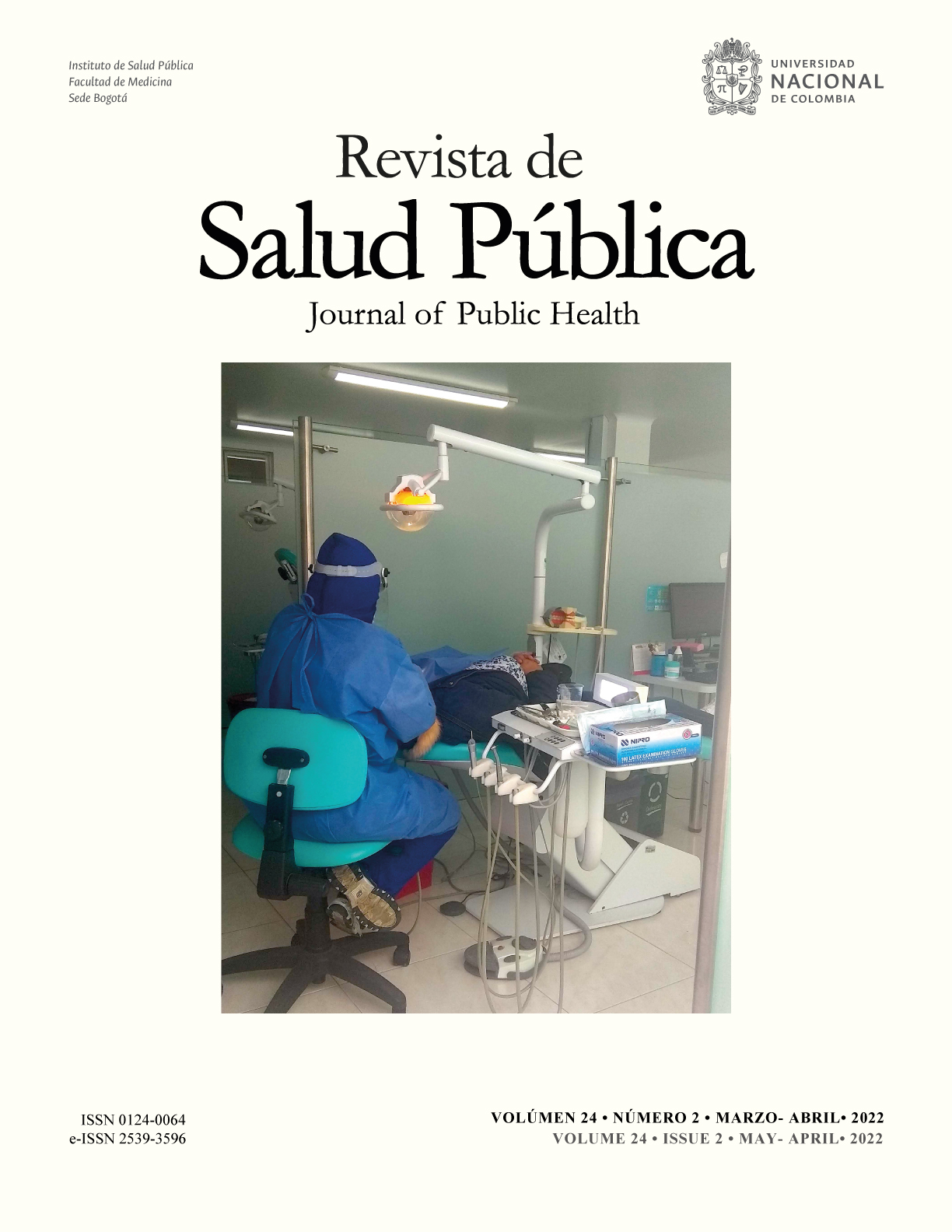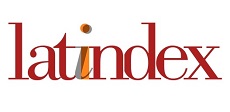Consumo de alcohol en mujeres embarazadas y lactantes: factores de riesgo y protección asociados
Alcohol use in pregnant and breastfeeding women: associated risk and protective factors
DOI:
https://doi.org/10.15446/rsap.v24n2.94850Palabras clave:
Consumo de bebidas alcohólicas, mujeres embarazadas, lactancia materna, factores de riesgo, factores protectores (es)Alcohol drinking, pregnant women, breast feeding, risk factors, protective factors (en)
Descargas
Objetivo Examinar la ocurrencia del consumo de alcohol en mujeres embarazadas o en periodo de lactancia de la provincia de Córdoba (Argentina) y los factores de riesgo/protección que explican ese consumo.
Metodología Participaron 475 mujeres (202 embarazadas y 273 lactantes) entre 18-47 años que completaron una encuesta en línea, que indagó sobre su consumo de alcohol y una serie de factores de riesgo y protección para el consumo de alcohol.
Resultados El 93,1% y 68,1% de las mujeres embarazadas y lactantes indicaron que no consumían alcohol en su condición. Se observó un perfil más riesgoso en mujeres lactantes. En embarazadas, solo la percepción de riesgo permitió explicar su consumo. En lactantes, la percepción de riesgo, el consumo de convivientes, la indicación de no beber en su condición por parte de familiares/amistades y la aprobación del consumo de alcohol en otras mujeres lactantes permitieron explicar su consumo.
Discusión Estos resultados ponen en evidencia la necesidad de brindar información clara y precisa sobre los riesgos asociados al consumo de alcohol durante el embarazo y, especialmente, la lactancia y la necesidad de incorporar cuatro actores sociales en las campañas preventivas: los profesionales de la salud, los/las convivientes, la familia y las amistades de la mujer gestante/lactante.
Objective This work examined alcohol use and risk and protective factors related among pregnant and breastfeeding women from Córdoba (Argentina).
Methodology In total, 475 women (202 pregnant and 273 breastfeeding) between 18-47 years old participated. Participants completed an online survey that measured alcohol use and the occurrence of different risk and protective factors for alcohol use.
Results The 93,1% of pregnant and 68,1% of breastfeeding women reported no alcohol use. A riskier profile was observed in breastfeeding women. Among pregnant women, only risk perception explained their alcohol use. Among breastfeeding women, risk perception, alcohol use of the persons they live with, the recommendation of not drinking in their condition by relatives or friends and alcohol use approval in other breastfeeding women explained their alcohol use.
Discussion Our results highlight the need to provide clear and precise information about the risks associated with alcohol use during pregnancy and, specially, breastfeeding and the need to incorporate four social actors in prevention campaigns: health professionals and cohabitants, family and friends of the pregnant or breastfeeding woman.
Referencias
DeJong K, Olyaei A, LO JO. Alcohol use in pregnancy. Clin Obstet Gyneco. 2019; 62(1):142-55. https://doi.org/10.1097/GRF.0000000000000414.
Mennella JA, Pepino MY, Teff KL. Acute alcohol consumption disrupts the hormonal milieu of lactating women. J Clin Endocrinol Metab. 2005; 90(4):1979-85. https://doi.org/10.1210/jc.2004-1593.
Popova S, Lange S, Probst C, Gmel G, Rehm J. Estimation of national, regional, and global prevalence of alcohol use during pregnancy and fetal alcohol syndrome: a systematic review and meta-analysis. Lancet Glob Health. 2017; 5(3):290-9. https://dx.doi.org/10.1016/.
Haastrup MB, Pottegård A, Damkier P. Alcohol and breastfeeding. Basic Clin Pharmacol Toxicol. 2014; 114(2):168-73. https://doi.org/10.1111/bcpt.12149.
López MB, Arán-Filippetti V, Cremonte M. Consumo de alcohol antes y durante la gestación en Argentina: prevalencia y factores de riesgo. Rev Panam Salud Publica. 2015; 37:211-7.
Franco R, Charro B, Xavier, MR. Perspectivas y experiencias sobre el consumo de bebidas alcohólicas durante el embarazo: estudio cualitativo con embarazadas de España, Francia y Portugal. ex aequo. 2020; 41:107-21. https://doi.org/10.22355/exaequo.2020.41.07.
Jones SC, Telenta J. What influences Australian women to not drink alcohol during pregnancy? Aust J Prim Health. 2012; 18(1):68-73. https://dx.doi.org/10.1071/PY10077.
Meurk CS, Broom A, Adams J, Hall W, Lucke J. Factors influencing women’s decisions to drink alcohol during pregnancy: findings of a qualitative study with implications for health communication. BMC Pregnancy Childbirth. 2014; 14(1):1-9. https://doi.org/10.1186/1471-2393-14-246.
Nordeng H, Ystrøm E, Einarson A. Perception of risk regarding the use of medications and other exposures during pregnancy. Eur J Clin Pharmacol. 2010; 66(2):207-14. https://doi.org/10.1007/s00228-009-0744-2.
Bakhireva LN, Wilsnack SC, Kristjanson A, Yevtushok L, Onishenko S, Wertelecki W, et al. Paternal drinking, intimate relationship quality, and alcohol consumption in pregnant Ukrainian women. J Stud Alcohol Drugs. 2011; 72(4):536-44. https://doi.org/10.15288/jsad.2011.72.536.
Watt MH, Eaton LA, Dennis AC, Choi KW, Kalichman SC, Skinner D, et al. Alcohol use during pregnancy in a South African community: Reconciling knowledge, norms, and personal experience. Matern Child Health J. 2016; 20(1):48-55. https://doi.org/0.1007/s10995-015-1800-4.
Kesmodel U, Schiøler Kesmodel P. Drinking during pregnancy: attitudes and knowledge among pregnant Danish women, 1998. Alcohol Clin Exp Res. 2002; 26(10):1553-60. https://doi.org/10.1111/j.1530-0277.2002.tb02455.x.
López MB. Saber, valorar y actuar: relaciones entre información, actitudes y consumo de alcohol durante la gestación. Salud y Drogas [Internet]. 2013 [cited 2021 Mar 2]; 13(1):35-46. https://bityl.co/DMRW.
Dumas A, Toutain S, Simmat-Durand L. Alcohol use during pregnancy or breastfeeding: A national survey in France. J Womens Health. 2017; 26(7):798-805. https://doi.org/10.1089/jwh.2016.6130.
Maloney E, Hutchinson D, Burns L, Mattick RP, Black E. Prevalence and predictors of alcohol use in pregnancy and breastfeeding among Australian women. Birth. 2011; 38(1):3-9. https://doi.org/10.1111/j.1523-536X.2010.00445.x.
Blasco-Alonso M, González-Mesa E, Montes MG, Bravo IL, Galdón FM, Campos FC, et al. Exposición a tabaco, alcohol y drogas de abuso en gestantes. Estudio de prevalencia en gestantes de Málaga (Espa- ña). Adicciones. 2015; 27(2):99-108. https://doi.org/10.20882/adicciones.695.
Smith L, Savory J, Couves J, Burns E. Alcohol consumption during pregnancy: cross-sectional survey. Midwifery. 2014; 30(12):1173-8. https://dx.doi.org/10.1016/j.midw.2014.04.002.
Yang Tay R, Wilson J, McCormack C, Allsop S, Najman J, Burns L, et al. Alcohol consumption by breastfeeding mothers: Frequency, correlates and infant outcomes. Drug Alcohol Rev. 2017; 36(5):667-76. https://doi.org/10.1111/dar.124733.
Giglia R, Binns C. Alcohol and breastfeeding: what do Australian mothers know? Asia Pacific journal of clinical nutrition. 2006; 16(1):473-7. https://doi.org/10.6133/apjcn.2007.16.s1.87.
Dumas A, Toutain S, Hill C, Simmat-Durand L. Warning about drinking during pregnancy: lessons from the French experience. Reproductive health. 2018; 15(1):1-9. https://doi.org/10.1186/s12978-018-0467-x.
Raymond N, Beer C, Glazebrook C, Sayal K. Pregnant women's attitudes towards alcohol consumption. BMC Public Health. 2009; 9(1):1-8. https://doi.org/10.1186/1471-2458-9-175.
Merrill RM. Use of marijuana and changing risk perceptions. Am J Health Behav. 2015; 39(3):308-17. https://doi.org/10.5993/AJHB.39.3.3.
Parker MA, Anthony JC. Population-level predictions from cannabis risk perceptions to active cannabis use prevalence in the United States, 1991-2014. Addict Behav. 2018; 82:101-4. https://doi.org/10.1016/j.addbeh.2018.02.030.
López MB, Lichtenberger A, Cremonte M. Predictors of alcohol use disorders in argentinean pregnant women. J Fetal Alcohol Spec Risk Prev. 2019; 2(1):23-8. https://doi.org/10.22374/jfasrp.v2i1.4.
Dossou G, Gallopel-Morvan K, Diouf JF. The effectiveness of current French health warnings displayed on alcohol advertisements and alcoholic beverages. Eur J Public Health. 2017; 27(4):699-704. https://doi.org/10.1093/eurpub/ckw263.
López MB, Arán-Filippetti V. Consecuencias de la exposición prenatal a alcohol: desarrollo histórico de la investigación y evolución de las recomendaciones. Rev Colomb Obstet Gineco. 2014; 65(2):162-73. https://doi.org/10.18597/rcog.64.
Crawford-Williams F, Steen M, Esterman A, Fielder A, Mikocka-Walus A. “If you can have one glass of wine now and then, why are you denying that to a woman with no evidence”: knowledge and practices of health professionals concerning alcohol consumption during pregnancy. Women Birth. 2015; 28(4):329-35. https://dx.doi.org/10.1016/j.wombi.2015.04.003.
Cómo citar
APA
ACM
ACS
ABNT
Chicago
Harvard
IEEE
MLA
Turabian
Vancouver
Descargar cita
Licencia

Esta obra está bajo una licencia internacional Creative Commons Atribución 4.0.
Esta revista provee acceso libre inmediato a su contenido bajo el principio de que hacer disponible gratuitamente investigación al publico apoya a un mayor intercambio de conocimiento global.
Todos los contenidos de esta revista, excepto dónde está identificado, están publicados bajo una Licencia Creative Commons Atribución 4.0.





















